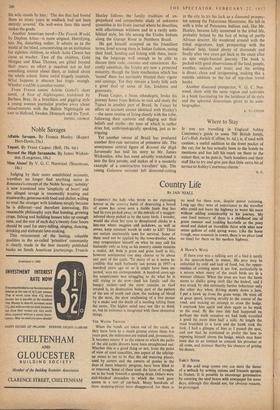Noble Savages
Man Alone! By V. G. C. Norwood. (Boardman, 18s.) Judging by their more uninhibited accounts, travellers no longer find anything naive in Rousseau's concept of the Noble Savage; 'nobility' is now translated into 'simplicity of heart' and the alleged savage is reasonably trusting and trustworthy, generous with food and shelter, willing to treat the stranger with kindness simply because he is different—and therefore interesting. His reasonable philosophy says that hunting, growing crops, fishing and building houses take up enough time, and the rest of each day's twenty-four hours should be used for story-telling, singing, dancing, drinking and elaborate love-making.
This restatement of the lasting, valuable qualities in the so-called 'primitive' community is clearly made in the best recently published books on South American journeyings. Francis Huxley follows the family tradition of un- prejudiced and sympathetic study of unknown quantities in his lively journal where he describes, with affectionate wittiness and in a racily unin- hibited style, his life among the Urubu Indians along the Gurupi River in Northern Brazil.
He got himself accepted on the friendliest terms, lived among them in Indian fashion, eating their food, hunting and fishing with them, learn- ing the language well enough to be able to discuss their code, customs and consciences. Re- cently cannibals, the Urubu are now a protected minority, though the State mechanism which has `tamed' them has inevitably blunted their vigour and courage. Yet they remain a lively folk with a great deal of sense of fun, kindness and generosity.
Franz Caspar, a Swiss ethnologist, broke his journey home from Bolivia to visit and study the Tupari in another part of Brazil. In Tupari he offers an account almost identical with Huxley's —the same routine of living closely with the tribe, following their customs and digging out their beliefs and myths—the tone of which is rather drier but, anthropologically speaking, just as in- triguing.
Yet another corner of Brazil has produced another first-rate narrative of primitive life. The anonymous central figure of Beyond the High Savannahs has told his story to Mr. James Wickenden, who has most adroitly translated it into the first person, and makes of it a masterly example of a constructive travellers' tale. The young Guianese narrator left diamond-cutting
in the city to try his luck as a diamond prospec- tor among the Pakaraima Mountains. He fell in with a tribe of Patamona Indians and, like Mr. Huxley, became fully immersed in the tribal life, probably helped by the fact of being of partly African descent. He wandered around with the tribal migrations, kept prospecting with the Indians' help, found plenty of diamonds and finally after two years got back to the coast after an epic single-handed journey. The book is packed with good observations of the land, people, weather, animals and trees; and the writing is direct, clean and invigorating, making this a notable addition to the list of top-class travel books.
Another diamond prospector, V. G. C. Nor- wood, deals with the same region and activities in a book fascinating for the luridness of its style and the splendid dimensions given to its auto- biographer.
A. V, COTON










































 Previous page
Previous page